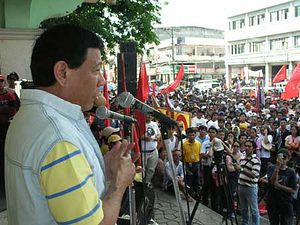Over the past few weeks, we have seen a number of bold announcements from the government of Philippine President Rodrigo Duterte about the state of conflicts in the country that may in fact belie their actual status and broader significance.
Last week, after five months, Philippine President Rodrigo Duterte declared the “liberation” of Marawi City, where a local armed group with suspected ISIS-links has been holed up fighting government troops. Earlier this month, Duterte canceled the infamous Oplan Tokhang (anti-drug campaign) of the police and turned over the mandate to run after drug lords and their operators to the Philippine Drug Enforcement Agency. Meanwhile, Duterte’s army chief vowed to wipe out the long-running communist insurgency before the end of 2018.
But do these announcements really signify the end of Duterte’s triple wars: the war on drugs, the all-out war against communist rebels, and the war against terror in Mindanao?
If so, that could be significant because it would allow the Duterte government to now focus on achieving his vision of transforming the Philippines into a federal state. While the federalism movement is gaining more supporters across the country, it remains an ambitious political objective because it requires an overhaul of the constitution.
But these wars have in fact not really ended at all. The Marawi siege has ended but a broader terror threat remains. Even the government has admitted that there are still “remnant” extremists linked with ISIS. In fact, martial law remains in effect on the whole island of Mindanao. The “victory” in Marawi actually exposed the weakness of the military. Asked why it took them five months to defeat the insurgents in Marawi, an army official explained that soldiers lacked training in urban warfare.
With regard to the war on drugs, Duterte ended Tokhang not because it was deemed a success but only after his public rating went down as the clamor against drug-related extrajudicial killings became louder in the past month. The drug menace is far from being eradicated, which means the public should not expect Duterte to back down on his avowed goal of fighting illegal drugs.
Meanwhile, the bold declaration of defeating communist rebels belonging to the New People’s Army (NPA) is similar to the claim of previous governments that the military is capable of ending Asia’s longest-running communist threat. The NPA is supposed to be a vanquished force at this time, but it continues to be a national security threat.
Despite the rhetoric of “liberation” in Marawi and the claim of an anticipated military victory over the NPA, not to mention the removal of the police from anti-drug operations, the social and political backlash generated by these local conflicts will likely continue to haunt the Duterte government.
It also bears emphasizing that these local wars are in fact not really preventing Duterte from implementing his bid for federalism. On the contrary, he has been invoking these threats to justify the possible declaration of a nationwide martial law or even a so-called revolutionary government. Indeed, some analysts believe that resorting to strongman rule could be part of Duterte’s plan to expedite the passage of the federalism bill.
The end of fighting in Marawi and the canceling of Tokhang could also help uplift the image of Duterte and the Philippines a month before the country’s hosting of the East Asian Summit. As host of an important international gathering, it would be more difficult for Duterte to evade embarrassing questions if the government has not yet resolved the Marawi crisis and the Tokhang controversy. Now that Marawi has been “liberated” and Tokhang operations have ceased, perhaps the government would try to redirect media coverage and global interest to other issues such as Duterte’s economic program (Dutertenomics), the “defeat” of ISIS, and the historic first meeting between the Philippine leader and U.S. President Donald Trump.
But that still leaves the question: how will the government manage Duterte’s unfinished wars? Getting a clearer sense of this – beyond empty rhetoric and catchy slogans – will be significant not only to determine the course of Duterte’s presidency, but the outlook for the Philippines as a country.

































